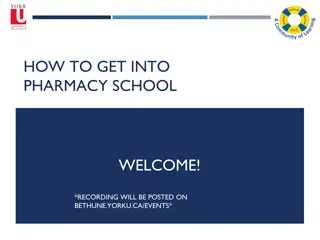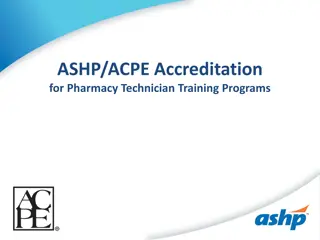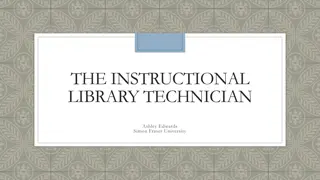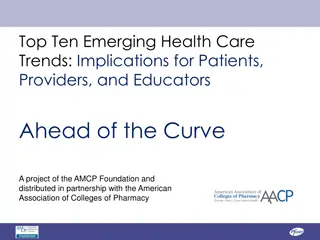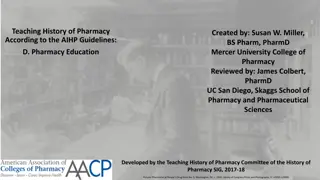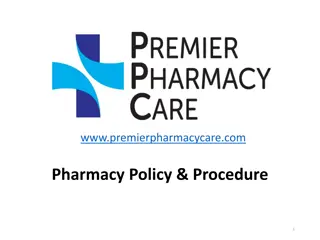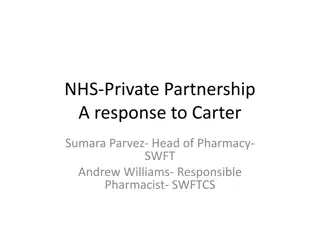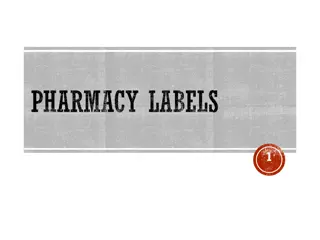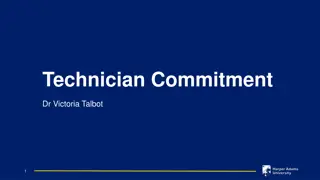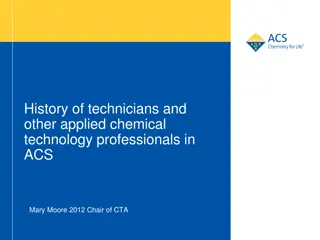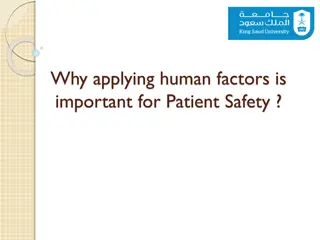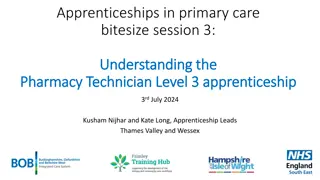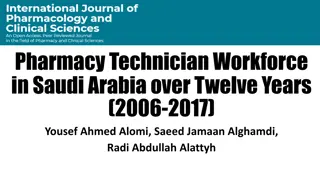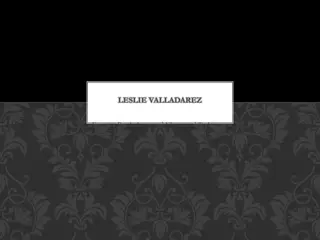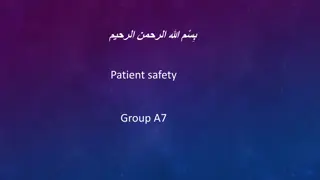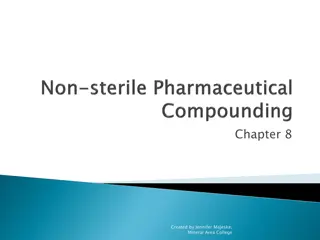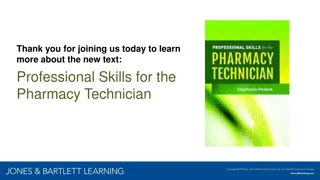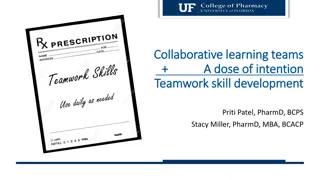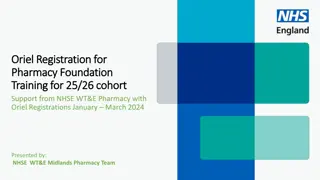Advancements in Pharmacy Technician Education and Training Standards
Explore the evolving landscape of pharmacy technician education and training standards, including various entry points, types of programs, accreditation by PTAC, and details about the conference organized by PTCB, ASHP, and ACPE. Learn about the key developments shaping the future of pharmacy technician profession.
Download Presentation

Please find below an Image/Link to download the presentation.
The content on the website is provided AS IS for your information and personal use only. It may not be sold, licensed, or shared on other websites without obtaining consent from the author. Download presentation by click this link. If you encounter any issues during the download, it is possible that the publisher has removed the file from their server.
E N D
Presentation Transcript
Pharmacy Technician Education and Training Standards: Update
VARIOUS POINTS OF ENTRY FOR PHARMACY TECHNICIANS Retail Based Hospital Based Registration Licensure Certification Board Regulation Employer Training Board approved exam Formal Education PTCE ExCPT State Exam Programmatically accredited Non accredited
TYPES OF PHARMACY TECHNICIAN EDUCATION/TRAINING PROGRAMS Certificate and degree programs in community colleges or technical schools College of Pharmacy associated programs Employer sponsored programs High school programs Military training programs Certification review courses Distance learning
PHARMACY TECHNICIAN ACCREDITATION COMMISSION (PTAC) ASHP has been accrediting technician programs in the 1970 s on a voluntary basis In 2012, NABP requests for ACPE to participate in pharmacy technician education and training accreditation PTAC formed through ASHP/ACPE collaboration in 2013 ACPE Board approved ASHP standards, guidelines, and procedures for PTAC PTAC recommendations require approval of both ASHP and ACPE Boards First PTAC recommendations to ASHP and ACPE boards for accreditation actions occurred at their June 2015 meetings and were approved
PTAC MEMBERS John J. Smith, ED Past Chair Donna S. Wall, BCPS, FASHP Chair Hope Ballard Angela Cassano, Pharm D, BCPS, FASHP Michael Diamond, MSc Jacqueline Hall, RPH, MBA Charles E. Daniels, PhD Barbara Giacomelli, PharmD, MBA Mario S. Garcia, BS, RPHT Barbara Lacher, BS, RPHTECH, CPHT Vice Chair Lisa S. Lifshin, BS Pharm, ASHP Secretary LIAISON TO ACPE BOARD OF DIRECTORS Michael A. Mon , RPH, JD, FAPHA LIAISON TO ASHP BOARD OF DIRECTORS Kelly Smith, Pharm.D., BCPS, FASHP, FCCP
http://www.ajhp.org/content/ajhp/early/2017/06/07/ajhp170283.full.pdf?sso-checked=true
ABOUT THE CONFERENCE Planned by PTCB, ASHP, ACPE with the help of a multi- stakeholder advisory group Sponsored by the Pharmacy Technician Certification Board Held February 14 16, 2017 in Irving, Texas 89 invited participants 350 individuals participated remotely in the plenary sessions Attendees included the public, pharmacists and technicians from various types of practice and education settings and public members
Recommendations from Stakeholder Consensus Conference Defining Pharmacy Technicians Pharmacy Technician Education Required Knowledge, Skills, and Abilities of Entry-- Level Pharmacy Technicians Certification of Pharmacy Technicians State Laws and Regulations on Pharmacy Technicians Advanced Pharmacy Technician Practice Moving Forward on Pharmacy Technician Issues
EDUCATION OF PHARMACY TECHNICIANS 3 0 26 Most conferees agreed that national standards should guide technician education, and that technician education programs should be accredited. 71 Strongly Agree Agree Disagree Strongly Disagree
Standard Writing Subcommittee* Tim Koch, RPh, PD,CHC Sr Director, Pharmacy Practice Compliance Walmart Corporate Office Kenneth Mark Ey, RPh Vice President of Operations CARE Pharmacies Cooperative Inc. Rafael Saenz, PharmD, MS, FASHP Administrator, Pharmacy Services, University of Virginia Health System Assistant Dean, VCU School of Pharmacy - UVA Division John J. Smith, Ed.D Deputy Superintendent East San Gabriel Valley Regional Occupational Program & Technical Center West Covina, CA PTAC Chair Barbara Lacher, BS, RPHTECH, CPHT Assistant Program Director & Associate Professor of Pharmacy Technician Program North Dakota State College of Science PTAC Member Peter H. Vlasses, PharmD, DSc(Hon), FCCP Executive Director Accreditation Council for Pharmacy Education Janet A. Silvester, PharmD, MBA, FASHP Vice President, Accreditation Services Accreditation Services Office, ASHP Lisa S. Lifshin, RPh, BCNSP Director of Pharmacy Technician Accreditation and Residency Services. Secretary to PTAC Accreditation Services Office, ASHP Sheri Roumell, BS, CPhT, RPT Pharmacy Technology Program Director Casper College Casper, WY ASHP/ACPE Lead Surveyor Donna S. Wall, BCPS, FASHP Clinical Pharmacist Indiana University Hospital Indianapolis, IN PTAC Vice Chair Supported by Angela Cassano, PharmD, BCPS, FASHP President Pharmfusion Consulting, LLC PTAC Member *Appointed July 2017
Standard Revision Process Review of the PTSCC recommendations PTCE job analysis review ExCPT blue print review Compared job analyses to the existing standard Any PTSCC recommended entry-level competencies missing were added Separated entry-level competencies from advanced-level competencies
Standard Revision Process Draft standards were developed by the writing group from August 2017 to January 2018 Draft standards were sent out broadly for stakeholder comment the end of January 2018 , with a two month comment period The writing group reviewed the stakeholder feedback (500 comments from 50 sources) and provided a draft for further review by the PTAC at their May 2018 meeting for review PTAC is sending the final draft to ASHP and ACPE Boards for approval at their June 2018 meetings Approved revised standards will be published with accreditation reviews based on the new standards starting in January 2019
DRAFT ASHP/ACPE Accreditation Standards for Pharmacy Technician Education and Training Programs Purpose: protect the public by ensuring the availability of a competent workforce; describe pharmacy technician education and training program development at the Entry-level and Advanced- level; provide criteria for the evaluation of new and established education and training programs; and promote continuous improvement of established education and training programs
SECTION I: COMPETENCY EXPECTATIONS Entry-Level The program prepares students for practice as Entry-level pharmacy technicians in a variety of contemporary settings (e.g., community, hospital, home care, long-term care) and has students acquire knowledge, skills, behaviors, and abilities needed for such practice. Advanced-Level The program prepares students for practice as Advanced-level pharmacy technicians, in a broad range of advanced roles in a variety of contemporary settings (e.g., community, hospital, home care, long-term care) and has students acquire additional knowledge, skills, behaviors, and abilities beyond those of the Entry-level pharmacy technician, needed for such advanced practice.
Three Sections of the ASHP/ACPE Standards SECTION I: COMPETENCY EXPECTATIONS Standards # 1 to 5 SECTION II: STRUCTURE AND PROCESS TO PROMOTE ACHIEVEMENT OF COMPETENCY EXPECTATIONS Standards # 6 to 13 SECTION III: ASSESSMENTS OF STANDARDS AND KEY ELEMENTS Standards # 14 to 15
SECTION I: COMPETENCY EXPECTATIONS Standard 1: Personal/Interpersonal Knowledge and Skills Entry-level: 8 Key Elements Advanced-level: 4 Key Elements Standard 2: Foundational Professional Knowledge and Skills Entry-level: 8 Key Elements Advanced-level: 3 Key Elements Standard 3: Processing and Handling of Medications and Medication Orders Entry-level: 21 Key Elements Advanced-level: 9 Key Elements Standard 4: Patient Care, Quality and Safety Knowledge and Skills Entry-level: 8 Key Elements Advanced-level: 5 Key Elements Standard 5: Regulatory and Compliance Knowledge and Skills Entry-level: 8 Key Elements Advanced-level: 2 Key Elements
SECTION II: STRUCTURE AND PROCESS TO PROMOTE ACHIEVEMENT OF EDUCATIONAL OUTCOMES Standard 6: Authority and Responsibility provided to Program Director 9 Key Elements Standard 7: Strategic Plan 2 Key Elements Standard 8: Advisory Committee 5 Key Elements Standard 9: Curricular Length Entry-level: 4 Key Elements Advanced-level: 2 Key Elements
SECTION II: STRUCTURE AND PROCESS TO PROMOTE ACHIEVEMENT OF EDUCATIONAL OUTCOMES Standard 9: Curricular Length Entry-level: 400 hours, 8 weeks 300 hours divided as: Didactic 120 hours Simulation 50 hours Experiential 130 hours 100 hours allocated as program director and faculty see fit Advanced-level: 600 hours, 15 weeks (includes Entry-level hrs) 460 hours divided as: Didactic 160 hours (40 more hours beyond Entry-level) Simulation 100 hours (50 more beyond Entry-level) Experiential 200 hours (70 more hours beyond Entry-level) 140 hours allocated as program director and faculty see fit
SECTION II: STRUCTURE AND PROCESS TO PROMOTE ACHIEVEMENT OF EDUCATIONAL OUTCOMES (cont.) Standard 10: Curricular Composition and Delivery (includes distance learning expectations) 8 Key Elements; Distance Learning 4 Key Elements Entry-level: Students complete at least one experiential rotation in a dispensing pharmacy setting where the student will utilize skills learned during their entry-level curriculum Advanced-level: Students complete at least one additional experiential rotation, in addition to any completed during an entry-level program. This advanced experiential rotation takes place in a facility where the student will utilize skills learned during the advanced- level curriculum. Standard 11: Student Recruitment, Acceptance, Enrollment, and Representation - 8 Key Elements Standard 12: Faculty/Instructors - 4 Key Elements Standard 13: Documentation - 8 Key Elements
SECTION III: ASSESSMENTS OF STANDARDS AND KEY ELEMENTS Standard 14: Assessment of Competency Expectations 14.1 Student Learning Assessments 6 Key Elements 14.2 Program assessments 5 Key Elements (a) program completion; (b) performance on national certification examinations or; performance on a psychometrically valid evaluation; (c) program satisfaction, including student, graduate, and employer satisfaction; (d) job placement; and (e) assessment data used in the continuous quality improvement process is actively maintained. Standard 15: Assessments of Structure and Process 3 Key Elements








